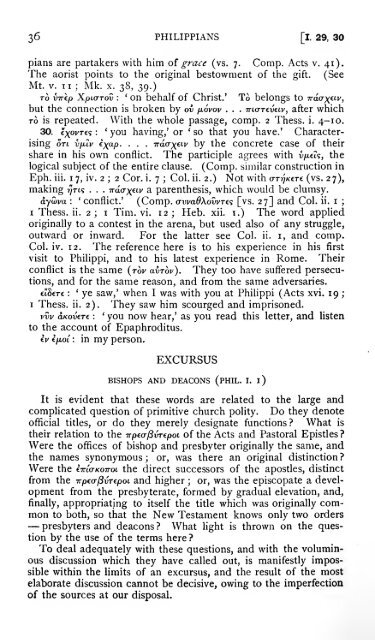Philippians and Philemon - MR Vincent - 1906.pdf
Philippians and Philemon - MR Vincent - 1906.pdf
Philippians and Philemon - MR Vincent - 1906.pdf
You also want an ePaper? Increase the reach of your titles
YUMPU automatically turns print PDFs into web optimized ePapers that Google loves.
36 PHILIPPIANS [l. 29, 30<br />
pians are partakers with him oi grace (vs. 7. Comp. Acts v, 41).<br />
The aorist points to the original bestowment of the gift. (See<br />
Mt. V. II ; Mk. x. 38, 39.)<br />
' vrrkp : on behalf of Christ.' To belongs to «,<br />
but the connection is broken by ov . . .,after which<br />
TO is repeated. With the whole passage, comp. 2 Thess. i. 4-10.<br />
30. *<br />
: you having,' or ' ising oTi<br />
so that you have.' Character-<br />
^. . . . by the concrete case of their<br />
share in his own conflict. The participle agrees with ,<br />
the<br />
logical subject of the entire clause. (Comp. similar construction in<br />
Eph. iii. 1 7, iv. 2 ; 2 Cor. i. 7 ; Col. ii. 2.) Not with€€ (vs. 27),<br />
making . . . a parenthesis, which would be clumsy.<br />
'<br />
: conflict.' (Comp,^[vs. 27] <strong>and</strong> Col. ii. I<br />
;<br />
I Thess. ii. 2 ; i Tim. vi. 12 ; Heb. xii. i.) The word applied<br />
originally to a contest in the arena, but used also of any struggle,<br />
outward or inward. For the latter see Col. ii. i, <strong>and</strong> comp.<br />
Col. iv.<br />
visit to<br />
conflict<br />
12. The reference here is to his experience in his first<br />
Philippi, <strong>and</strong> to his latest experience in Rome. Their<br />
is the same { ). They too have suffered persecutions,<br />
<strong>and</strong> for the same reason, <strong>and</strong> from the same adversaries.<br />
' £8 : ye saw,' when I was with you at Philippi (Acts xvi. 19<br />
I Thess. ii. 2). They saw him scourged <strong>and</strong> imprisoned.<br />
vvv :<br />
' you now hear,' as you read this letter, <strong>and</strong> listen<br />
to the account of Epaphroditus.<br />
iv : in my person.<br />
EXCURSUS<br />
BISHOPS AND DEACONS (PHIL. I. l)<br />
It is evident that these words are related to the large <strong>and</strong><br />
complicated question of primitive church polity. Do they denote<br />
official titles, or do they merely designate functions? What is<br />
their relation to the of the Acts <strong>and</strong> Pastoral Epistles ?<br />
Were the offices of bishop <strong>and</strong> presbyter originally the same, <strong>and</strong><br />
the names synonymous ; or, was there an original distinction ?<br />
Were the the direct successors of the apostles, distinct<br />
from the <strong>and</strong> higher ; or, was the episcopate a development<br />
from the presbyterate, formed by gradual elevation, <strong>and</strong>,<br />
finally, appropriating to itself the title which was originally common<br />
to both, so that the New Testament knows only two orders<br />
— presbyters <strong>and</strong> deacons ? What Hght is thrown on the question<br />
by the use of the terms here ?<br />
To deal adequately with these questions, <strong>and</strong> with the voluminous<br />
discussion which they have called out, is manifestly impossible<br />
within the limits of an excursus, <strong>and</strong> the result of the most<br />
elaborate discussion cannot be decisive, owing to the imperfection<br />
of the sources at our disposal.<br />
;





